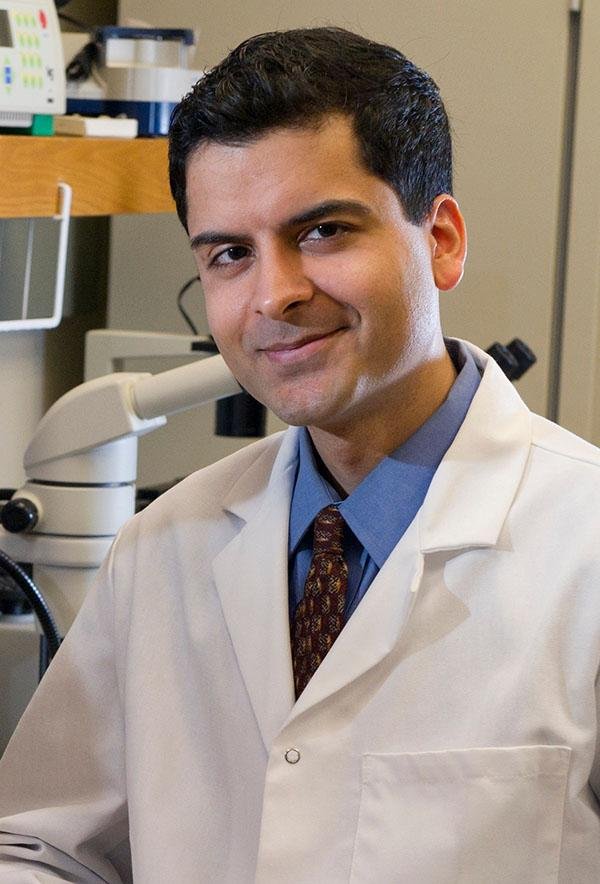Faculty Feature: Dr. Samie Jaffrey
For this newsletter’s Faculty Feature, Nick Bartelo (SVG Co-chair of Outreach) and Ellen Horste (Co-chair of Communications at Women in Bio) had the opportunity to sit down with Dr. Samie Jaffrey, Greenberg-Starr Professor of Pharmacology at Weill Cornell Medicine. Dr. Jaffrey received his MD-PhD from Johns Hopkins University in 1999. Dr. Jaffrey became an Assistant Professor at Weill Cornell Medicine in 2001 and has remained ever since. His lab is vertically integrated – answering important questions in neurobiology (defining the RNA-mediated mechanisms behind neuronal axon movement and growth), while also making advances in fundamental basic RNA biology in the functions and mechanisms behind m6a modifications and developing tools and sequencing methods to support this research. Dr. Jaffrey is a founder of Gotham Therapeutics, an epitranscriptomics platform technology company that is currently focused on RNA modifications in cancer as well as autoimmune and neurological disorders, and a scientific advisor to Chimerna, a biotech company spun out of his lab which focuses on creating stable RNAs through circularization. His experience as a founder and a scientific advisor to companies using technology from his lab has led to the widespread use of his research products around the world, advancing human healthcare.
SVG: Has your double degree as an MD-Ph.D. helped you more as a general scientist or as an entrepreneur?
Dr. Jaffrey: Getting an MD is very useful when the long-term goal of the scientific research is to benefit patient health. Medical training gives a better understanding of all the diverse types of diseases that exist and you learn the connections between your research and some types of disease that people who don't have a medical background may not even know exists.
It can help you frame your research and your grant applications and it can help you communicate about a potential medical treatment with funders, or drug companies, because you know about the existence of those diseases.
SVG: A company more recently spun out of your lab, Chimerna, is leveraging RNA-circularization technology. What is the benefit of RNA-circularization?
Dr. Jaffrey: The problem with all RNA-based therapeutics is that they are very unstable. When you get an injection of the mRNA vaccine for COVID, by 24 hours it's gone from your body. What remains for a few days is the protein that is made from the mRNA vaccine. Other types of RNA therapeutics, such as RNA aptamers are similarly unstable if not more unstable.
A lot of people chemically synthesize RNAs to make them more stable by incorporating modified nucleotides. But if you're expressing RNA aptamers in the cell in the context of gene therapy, the cell can only make the aptamer from the natural four nucleotides. Instead of having modified nucleotides, we can make RNAs more stable by making circles.
SVG: How has Chimerna evolved since its creation? What stage are they in?
Dr. Jaffrey: The company has focused on a lot of issues related to RNA delivery, RNA packaging, nanoparticles - things that we never think about in our lab. The founders are learning these things by interacting with scientists around the world, and testing out the latest technologies. They're also creating partnerships with other companies and licensing other IP from various companies and universities that would allow them to create different types of delivery methods for their RNA.
We are delaying venture capital investment for now because we want to get more evidence in animal models, which requires getting drug delivery issues resolved. Sometimes when you go for funding with stronger data, it can really help you find better VC partners. It's better to have really good upfront data when you go in.
SVG: What advice would you give to entrepreneurial scientists?
Dr. Jaffrey: First, stay connected to the blogs, newspaper reports, and articles about the goings-on in the startup community in the biotech space. There are a lot of websites that focus specifically on biotech startups and their discoveries, successes, failures, mergers, acquistions, etc. You can see over time how these companies grow and progress, and understand more about the lifecycle of these companies.
Second, I would encourage people to connect their research projects to their career goals. If you're interested in the biotech industry, pick thesis projects involving some aspect of drug development, therapy development, or device development so that you're going to be exposed to diseases and their treatments.

